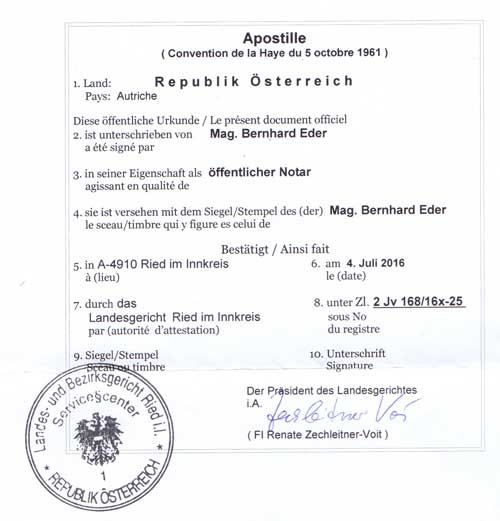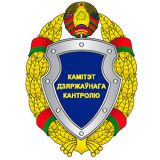
Schmidt & Schmidt компаниясы Австрияда берілген құжаттарды заңдастыру, яғни апостиль қою қызметтерін ұсынады.
Австрияда берілген құжаттарды Қазақстан Республикасының соттарына немесе өзге де мемлекеттік органдарына ұсыну үшін бұл құжаттарды заңдастыру рәсімінен өткізу қажет. Осы рәсімнің нәтижесінде мұндай құжат Қазақстан Республикасының аумағында заңды күшіне ие болады.
Австрия 1967 жылы қосылған, 1961 жылғы Гаага конвенциясының қатысушы мемлекеті болып табылады. Гаага конвенциясы құжаттарды апостиль қою арқылы жеңілдетілген заңдастыру рәсімін қолдануға мүмкіндік береді. Апостиль қойылған және нотариус куәландырған аудармасы бар австриялық құжат Қазақстанда Қазақстан Республикасында берілген құжаттармен бірдей заңды күшке ие болады.
Австриядағы апостиль — неміс тілінде жасалған төртбұрышты мөр болып табылады, онда міндетті түрде «Apostille» атауы және 1961 жылғы Гаага конвенциясына француз тілінде сілтеме көрсетіледі. (Convention de La Haye du 5 octobre 1961).

Австрияда апостиль қою арқылы мына құжаттар куәландырылуы мүмкін:
- Австрияның сауда реестрінен алынған анықтамалар
- Нотариус тарапынан берілген немесе куәландырылған құжаттар
- Білім туралы құжаттар
- Австрия соттары шығарған құжаттар - үкімдер мен сот шешімдері
- Сот аудармашысы жасаған аудармалар
- Австрияның мемлекеттік органдары берген ресми құжаттар
- Басқа да мемлекеттік үлгідегі құжаттар
Австрияда құжаттарды апостильмен растау құқығы жергілікті соттарға беріледі. Солай бола тұра, апостиль қою тек құжат берілген аймақтың соты арқылы жүргізілуі мүмкін
Апостильдеу болмайды
- Коммерциялық келісімшарттар
- Шоттар және шот-фактуралар
- Кедендік, дипломатиялық, консулдық құжаттар
- Паспорттар
Апостиль мен консулдық заңдастыру арасындағы айырмашылықтар:
Апостиль мен консулдық заңдастыруның ортақ белгісі – олар ресми құжаттың басқа елдің мекемелерінде қолданылуы үшін шынайылығын растайды. Алайда олардың арасында елеулі айырмашылықтар бар.
| Апостиль | Консулдық заңдандыру | |
|---|---|---|
| Шындық | Тек Гаага конвенциясына қатысушы елдер арасында ғана қолданылуы мүмкін. | Гаага конвенциясына қатыспайтын немесе қатысушы еместігінен бір немесе екі ел арасында, немесе бір тарап екінші тараптың қосылуына қарсы болған жағдайда қолданылады. |
| Алу қиындығы | Орташа. Апостиль алу үшін құжат берілген елдің уәкілетті органыға жүгіну қажет. | Жоғары. Консулдық заңдастыру үшін құжат берілген елдің әртүрлі органдарына және консулдықтарға жүгіну қажет |
| Алдын ала растау | Қажет емес. | Қажет. Құжатты берген органнан алдын ала растау қажет. |
| Мақсат елінің консулдық заңдастыруы | Мақсат елінің консулдығына жүгіну қажет емес. | Заңдастырудың соңғы кезеңі құжат берілген елде әдетте мақсат елінің консулдығында өтеді. |
Австрияда құжаттарды алу
Көп жағдайда азаматтық хал актілеріне қатысты құжаттар жоғалып кетеді немесе зақымданады, не болмаса құжаттардың өзекті көшірмелерін алу қажет болады. Мұндай жағдайда құжаттардың дубликаттарын алу керек. Көбінесе бұл процедурада қиындықтарға Австриядан көшіп кеткен адамдар тап болады. Біздің қызметіміз Австриядағы құжаттарды қашықтықтан алуға мүмкіндік береді және біз құжатты әлемнің кез келген нүктесіне курьерлік жеткізуді қамтамасыз ете аламыз.
Австриядан құжаттардың нотариалды аудармасы
Азаматтық хал актілерінің құжаттарының көшірмелері мен дубликаттары Австрияда присяждық аудармашы арқылы қазақ тіліне немесе басқа тілге аударылуы мүмкін немесе аударма мақсат елде орындалуы мүмкін. Біз азаматтық хал актілерінің құжаттарын нотариалды аударумен және кейінгі растамамен қамтамасыз етеміз. Жұмыстың бағасы нақты құжаттың көлеміне байланысты есептеледі.
























































